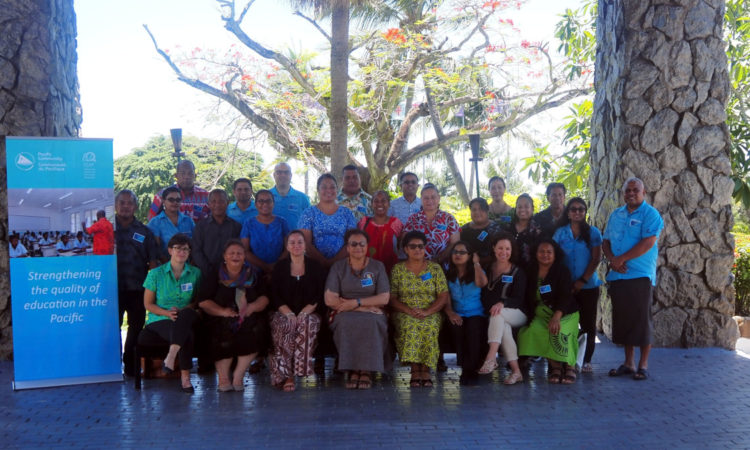Member countries, regional stakeholders and implementing agencies for the Pacific Regional Education Framework (PacREF) came together for the first time in a 3-day Secretariat of the Pacific Community-Educational Quality Assessment Program (SPC-EQAP) organized workshop to support the Monitoring, Evaluation and Learning for PacREF.
The workshop was held on 15-17 November at the Novotel, Nadi. It provided the platform for PacREF implementing agencies and participating countries to share significant changes and impacts through the implementation of PacREF activities from July to November 2022.
SPC’s EQAP Director, Dr Michelle Belisle, said the workshop was an opportunity for sharing learning, an initiative that member countries, implementing agencies, development partners and regional stakeholders committed to at the time of the PacREF design.
This was the first time we had representation from the implementing agencies, the PacREF Facilitation Unit, and the member countries to hear one another’s perspectives and experiences. It’s a chance to truly listen to what kinds of issues have arisen and to hear about what has gone well from these multiple perspectives. By coming together, we can hear and ask questions and try to understand the “why” behind the “what”.
Dr Belisle
Dr Belisle added that PacREF is a significant undertaking and is ground-breaking in many ways and a truly regional collaborative effort that brings together 15 countries and half a dozen implementing agencies as well as regional and international organizations to work collectively to achieve a set of substantive outcomes across four policy themes.
She said that while PacREF has the backing of the countries’ governments involved, participation is voluntary across the member states and aligned to priorities identified and refined by heads of education systems over 24 months.
As a result, the PacREF is a complex system of integrated work and relationships that requires commitment and effort to maintain.
It is the coming together to collectively learn from our experiences that will help us all to strengthen the PacREF and move closer to achieving the ambitious set of outcomes that the ministers endorsed.
Dr Belisle
The workshop also provided the opportunity for country contact persons to discuss the status of country data collection mechanisms and the form of support they may require in their roles and formulate recommendations for corrective action to bring work back on track, strategies to remove barriers and facilitate better engagement or identification of significant issues requiring the attention and possible intervention.
Member countries and PacREF representatives from Samoa, Tonga, Solomon Islands, Fiji, Tuvalu, Papua New Guinea, Niue, Nauru, The Republic of Marshall Islands, Cook Islands, Kiribati, Vanuatu, Federated States of Micronesia, and Palau presented on their PacREF activities, challenges, and learnings.
Implementing Agencies, including UNESCO, UNICEF, the University of the South Pacific’s Discipline of Education, Institute of Education and Pacific TAFE, also shared their activities progress and learnings during the event.
More information available online at www.pacref.or

